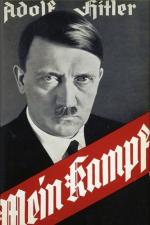
|
| Name: _________________________ | Period: ___________________ |
This test consists of 15 multiple choice questions and 5 short answer questions.
Multiple Choice Questions
1. What does Hitler emphasize in his speeches?
(a) His desire to lead Germany.
(b) His hatred of the Jews.
(c) The peace treaty.
(d) The various wars in which Germany has been involved.
2. When does Hitler's organization experience rapid growth?
(a) By 1929.
(b) By 1922.
(c) By 1912.
(d) By 1932.
3. What does Hitler find that many other parties are doing?
(a) Copying and adopting his party's programs.
(b) Slandering his party's programs.
(c) Destroying his party's programs.
(d) Sabotaging his party's programs.
4. To what do the disarmament terms of the peace treaty lead the French to think?
(a) Germany is still an enemy.
(b) Germany will be shattered.
(c) Germany will want to retaliate.
(d) Germany has some power left.
5. If their present situation continues, their society and political structure will be taken over by whom?
(a) The Marxists.
(b) The Russians.
(c) The Jews.
(d) The French.
6. When is a specific rallying point against Marxism premiered?
(a) In 1890.
(b) In 1910.
(c) In 1930.
(d) In 1920.
7. What are the results of all of the attempts at harming the party or its leaders?
(a) They are somewhat successful.
(b) They succeed.
(c) They are damaging to the party and its leaders.
(d) They fail.
8. What is the purpose of pre-War foreign policy?
(a) To encourage communication between Germany and other countries.
(b) To isolate the German states.
(c) To protect all who live within the borders of Germany.
(d) To help preserve the character of the German people.
9. When does one receive the right of citizenship in a folkish state?
(a) When one is born in a German state.
(b) When one is not a Jew.
(c) When one is fluent in German.
(d) When one completes one's military training.
10. What type of people come to be the leaders and the masses follow them?
(a) The most compassionate.
(b) The best.
(c) The worst.
(d) The most intelligent.
11. What would be the purpose of the National Socialist trade union?
(a) To represent the occupational interests of its members.
(b) To be used as a tool of class struggle.
(c) To control the workers.
(d) To convince others to join the union.
12. How many elements form the basis for state authority?
(a) Five.
(b) Two.
(c) Ten.
(d) Three.
13. The old Reich appears weak to the outside. What does it gives its citizens?
(a) What is needed to survive.
(b) No freedom.
(c) Some freedom.
(d) Internal freedom.
14. How many strong points exist in German foreign policy up until this time?
(a) Four.
(b) Two.
(c) Five.
(d) Three.
15. What does Hitler feel is the most important issue confronting Germany?
(a) The Jewish issue.
(b) The issue of wealth.
(c) The French issue.
(d) The Russian issue.
Short Answer Questions
1. What must be encouraged among the masses?
2. How does Hitler view the existence of Jews in political bodies?
3. What should be the goal of the present foreign policy?
4. Who does Hitler accuse of pillaging the German nation through war societies?
5. How does Hitler believe terror should be fought?
|
This section contains 499 words (approx. 2 pages at 300 words per page) |

|




